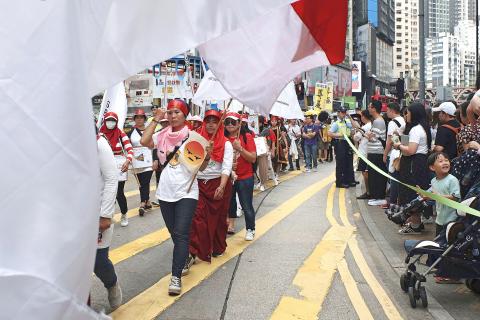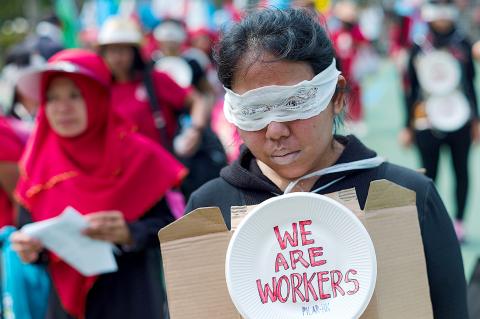The sun had not yet risen in Hong Kong when Sally, a domestic worker, was woken and told she needed to leave immediately. As she lay on the sofa, confused, Sally saw her employer standing over her with a piece of paper he wanted her to sign. It was a resignation letter he had written for her. She was being let go because she was pregnant. Her employer, a German man in his 50s, is the father of the child.
Sally (some names have been changed to protect their identity), 39, from Manilla in the Philippines, is one of the 390,000 domestic workers — mainly from poorer Asian countries — who keep Hong Kong functioning. One in every 20 employees in Hong Kong is a migrant worker , and most of these are women of child bearing age.
But because the terms of their working visas require maids to live at their employers’ homes, those who become pregnant can be fired by employers looking to avoid accommodating a baby and paying for maternity leave. They become homeless overnight, and two weeks later their residency permit expires. If they stay in Hong Kong illegally, they won’t be able to access healthcare or register the births of their children, who become stateless.

Photo: AP
VULNERABLE POPULATION
“This is a humanitarian tsunami,” says Kay McArdle, a Hong Kong-based lawyer and gender rights advocate. “These women and children are incredibly vulnerable.”
Sally had been working for her employer for three years, and for much of that time they were in a relationship, she says. Despite sharing a bed, her employer still expected her to get up at dawn to tend to the apartment. Each evening she was expected to have a meal waiting for him as soon as he came home from work. On Sundays, her day off, they would spend time together as a couple. But everything changed when she told him she was pregnant.

Photo: EPA
“He wanted to abort [the baby]. I said no. He would not accept this, so I moved to the sofa,” she says.
When she was thrown out, she stayed in various guesthouses. But her money ran out before her son, Peter, was born. Now the mother and baby are staying in a shelter for pregnant former maids and new mothers that have been made homeless, run by local charity Pathfinders. Each year, the organization deals with almost 1,000 cases of maids who run into difficulties when they get pregnant. It assists the women with visa and legal issues. Pathfinders is helping Sally petition her employer, who is denying he is the father, for child support.
“An employer is prohibited from dismissing a pregnant employee from the date on which she is confirmed pregnant by a medical certificate until the expiry of her maternity leave, except in serious disciplinary cases of dismissal due to the employee’s serious misconduct,” said the Hong Kong government’s labor department.
However, vulnerable foreign workers are often unaware of their rights.
“We know we see a fraction of cases, and the reality is employment discrimination of pregnant foreign domestic workers is much higher,” says Catherine Gurtin, CEO of Pathfinders. “Employers find other pretexts for firing their maid when she is pregnant, such as accusing them of theft.”
PETITIONING FOR SUPPORT
Pathfinders has successfully helped women petition for child support, and against unfair dismissal and gender discrimination. Of the cases they handle, 31 percent involve petitioning against unfair dismissal, and 18 percent of cases are for accessing child support, which is possible if the father is a resident of Hong Kong.
Lin, a former domestic helper, is preparing to return to the Philippines with her two-month old daughter. When her employers discovered she was pregnant they reduced the amount of food she was allowed, she says.
Fired and made homeless soon after, she is now living in the Pathfinder shelter. Her one request to the charity was to book her a flight that arrives at night, as she wants to reach her hometown in the dark to avoid people seeing her and the child.
“In my neighborhood they will think: ‘She is not good because she got pregnant in Hong Kong.’ I feel so shy to go back in the Philippines,” she says.
The loss of housing and income means these women can be trapped in abusive relationships. Anna-Maria lives in a small, dark apartment in a dilapidated high-rise building with her baby son, Emmanuel, and her partner, who is a Hong Kong resident.
“My partner was very angry with me when I became pregnant. He didn’t want the obligation, he wanted me to go back to the Philippines. When I was four months pregnant I started bleeding because of the stress,” she says.
For the first three months of Emmanuel’s life his father refused to acknowledge him. The mother and son lived in a hostel. The newborn was badly bitten by bed bugs. While Anna-Maria and her partner’s relationship has improved, she is worried the situation could flare up again.
Her partner gives her money for food and she is slowly putting some aside, she says, so that she can flee with her baby if the living situation becomes dangerous.
“I don’t know what is in his mind, so I need to prepare myself,” she says. “I’m a little bit scared.”

Google unveiled an artificial intelligence tool Wednesday that its scientists said would help unravel the mysteries of the human genome — and could one day lead to new treatments for diseases. The deep learning model AlphaGenome was hailed by outside researchers as a “breakthrough” that would let scientists study and even simulate the roots of difficult-to-treat genetic diseases. While the first complete map of the human genome in 2003 “gave us the book of life, reading it remained a challenge,” Pushmeet Kohli, vice president of research at Google DeepMind, told journalists. “We have the text,” he said, which is a sequence of

On a harsh winter afternoon last month, 2,000 protesters marched and chanted slogans such as “CCP out” and “Korea for Koreans” in Seoul’s popular Gangnam District. Participants — mostly students — wore caps printed with the Chinese characters for “exterminate communism” (滅共) and held banners reading “Heaven will destroy the Chinese Communist Party” (天滅中共). During the march, Park Jun-young, the leader of the protest organizer “Free University,” a conservative youth movement, who was on a hunger strike, collapsed after delivering a speech in sub-zero temperatures and was later hospitalized. Several protesters shaved their heads at the end of the demonstration. A

In August of 1949 American journalist Darrell Berrigan toured occupied Formosa and on Aug. 13 published “Should We Grab Formosa?” in the Saturday Evening Post. Berrigan, cataloguing the numerous horrors of corruption and looting the occupying Republic of China (ROC) was inflicting on the locals, advocated outright annexation of Taiwan by the US. He contended the islanders would welcome that. Berrigan also observed that the islanders were planning another revolt, and wrote of their “island nationalism.” The US position on Taiwan was well known there, and islanders, he said, had told him of US official statements that Taiwan had not

We have reached the point where, on any given day, it has become shocking if nothing shocking is happening in the news. This is especially true of Taiwan, which is in the crosshairs of the Chinese Communist Party (CCP), uniquely vulnerable to events happening in the US and Japan and where domestic politics has turned toxic and self-destructive. There are big forces at play far beyond our ability to control them. Feelings of helplessness are no joke and can lead to serious health issues. It should come as no surprise that a Strategic Market Research report is predicting a Compound